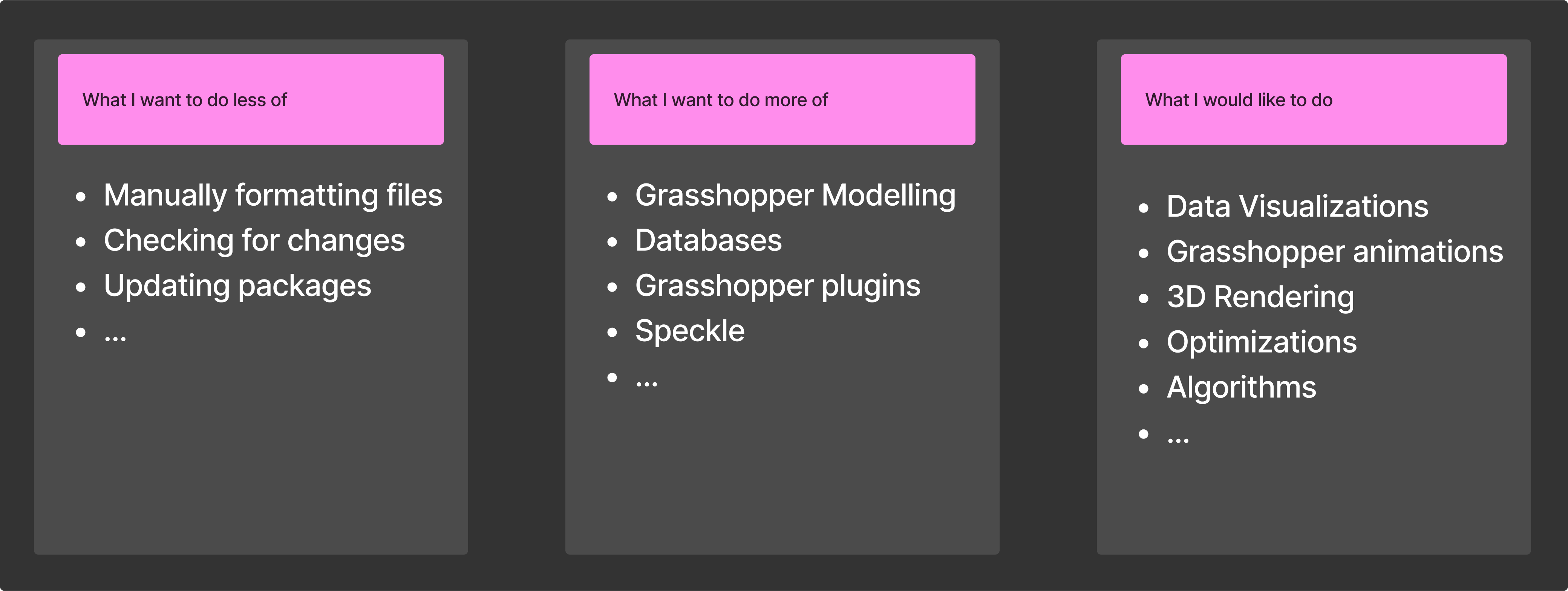Should you learn Grasshopper ?

Grasshopper is one of the most popular tools in computational design. It’s been around for over a decade and is even considered the industry standard for many companies out there. It has rightfully earned that right as Grasshopper has become a platform for modelling, scripting, and aggregating data from a variety of sources.
This makes Grasshopper one of the most compelling programs to learn. There are even some universities that now teach Grasshopper as part of their syllabus. But given how new and vast computational design is, it’s worth taking a step back and evaluating if Grasshopper is the tool that you need to learn next. The computational design field exists at the intersection of many other fields. This means we rely on many tools, not just Grasshopper. Your time might be better spent learning another tool that can increase your domain knowledge first. So, if you are considering learning Grasshopper, here are some points worth considering before you take the plunge.
Learn the Foundations
I didn’t learn Grasshopper through any formal education. I actually did a bachelor's in Aeronautical engineering where the idea of a tool like Grasshopper didn’t even exist. I only learned how to use the program because it was required in the job that I got shortly after graduating.
This approach has led me to see that Grasshopper is a type of multiplier. In my case, university taught me how aeroplane structures work, and learning Grasshopper taught me new perspectives on how to solve the same problem. I could see that for me to be effective at Grasshopper, I needed good foundational knowledge in the domain I was in. I needed to know about the domain before I could be an effective computational designer.
Since understanding this, I wished I spent some time learning the fundamentals of computer science first. It would have made me more effective at using Grasshopper at my work as I would have had a better understanding of what I was actually doing. I am not saying that you need to learn computer science before learning Grasshopper, but the idea is that you should get a good foundation in the domain you work in first before learning Grasshopper.
Consider your Goals
It’s worth asking yourself if there are other tools that you should be learning first. To determine this, you need to understand what you want to achieve in the next 6 months to a year. Learning something new is never easy. It demands a lot of effort and time to learn it well.
So, I think it’s important to pause and figure out what your long-term goals are. My goal at the time was to just keep up with my colleagues at work. It isn’t a bad goal but it felt like I learned Grasshopper for the sake of work rather than from genuine curiosity. You might find yourself in the same situation too, especially since Grasshopper is widely flaunted on social media and industry.
I don’t regret learning Grasshopper. It has had a positive impact on my career and life as a whole. Yet, I can’t help but feel that I got lucky with Grasshopper. If the company was another less-beneficial obscure tool, I would have still blindly gone along with learning it too because I wasn’t clear with my long-term goals.
Do a Skill or Tool Audit
To figure out what to learn next, whether it’s Grasshopper or something, it’s helpful to do an audit of your current skills and tools. I generally do this at the end of projects and every quarter of the year.
It’s about noting down the things that I enjoyed and didn’t enjoy doing in the work that I have been doing. Then, I take a look at the content I have been consuming and see what I would like to be doing. All in all, it’s a very simple table with three columns: “What I want to do less of”, “What I want to do more of” and “What I would like to do”.

It’s simple but I use this inventory of things to help me decide what I want to learn next. It helps me filter out all the external noise and pressures so that I can focus on what I want to be doing next. Instead of reacting to the next shiny thing.
Final Thoughts
It’s hard for me to tell someone in this space to not learn Grasshopper. Particularly, when I believe it to be a crucial tool in the space. My idea was to urge you to be intentional in choosing the next thing you learn. It should be something that contributes to your goals and your curiosity. Not something that you were pressured into learning because everyone is learning it.
Thanks for reading,
I hope that helps.
Braden
